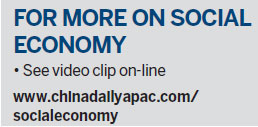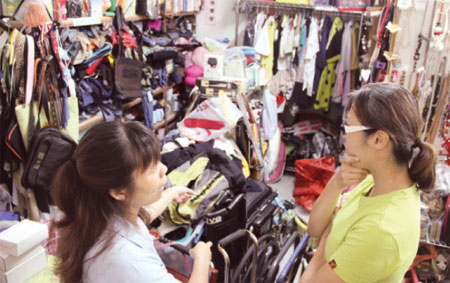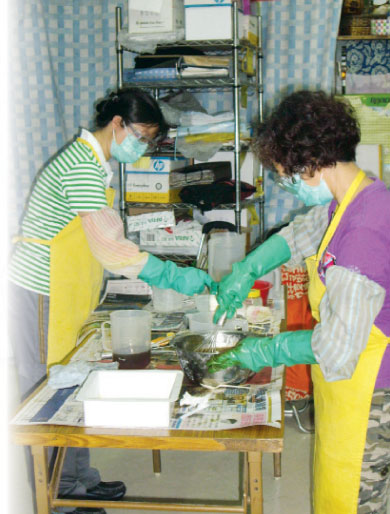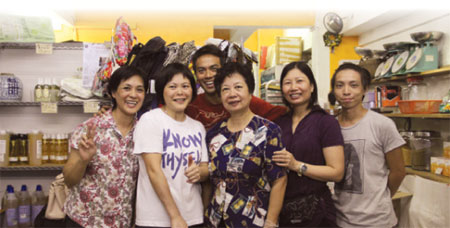Finding cures in social economy
Updated: 2012-08-02 06:51
By Andrea Deng(HK Edition)
|
|||||||
|
The Hong Kong Women Workers' Association created a platform for women to run a second-hand market in the community of Kwun Tong, encouraging them to be decision makers and offering affordable goods in the community. Demi Wu / China Daily |
|
Polly Luk Siu-king (left), director-general of Green Women Cooperative, said social economy offers job opportunities for housewives who work with a flexible time. Demi Wu / China Daily |
|
Tse Chun-man (third from left), operations officer of Ground Works, a social enterprise selling organic food, said sustainable agriculture should be supported by the community. Demi Wu / China Daily |
Big capital and monopolies are destroying Hong Kong, say those who called themselves social economists. They are people dedicated to creating a new community spirit and opportunities for all. Andrea Deng reports.
"The development of Hong Kong's economy and society is on the verge of a cliff," the document intoned ominously. "Reeling from the bouts of financial tsunamis ever since 1997, (Hong Kong has seen) the monopoly of land and capital aggravated. The house prices stay high-rising, inflation continues, the possibility of upward social mobility is shrinking, the yawning gap of wealth has widened as the number of poor rocketed."
There were only two reporters at the July 7 press conference at which that document was released by the Hong Kong Social Economies Alliance. It was United Nations International Cooperative Day. The dozens of others who filled the seats of the hall that day were mostly housewives.
The chilling forecast was part of the prologue of a 28-page policy framework that calls for changing "the order of the economy and of society".
The alliance advanced its idea of social economy as the remedy, transforming the model of economic and social development, by reconnecting economic activities to the community. The document enumerates such elements of social economy as cooperatives, social enterprises, community currency, fair trade, community-supported agriculture, and so forth.
On the surface, it sounds rather idealistic, but seen in practice, a different story emerges.
Tse Chun-man, majored Geography in China Studies in university, reveals his passion for his ideals, speaks in words that are direct and blunt.
"If you're looking for something like City'Super here, you've come to the wrong place," said Tse, in an assertive, possibly even aggressive tone. The explanation was not needed.
Tucked away in one of those ramps in Wan Chai a 10 minutes' walk from the MTR link, the shop where Tse works as an operations officer looks like an ordinary grocery store without any air-conditioning in the place, The ceiling fans above whirled and ground out a repetitive rhythm reminiscent of the old Hong Kong.
At his shop Ground Works, the small jars and bottles storing honey, apple cider vinegar, camellia oil, and all sorts of jams made of mushroom, roselle, cashew nuts, sesame, are placed to one side; while the shelf on the other side are placed bigger jars storing tempting biscuits made of peanuts, and sesame. In the baskets are small bags of ginger candies, dried flowers and black lotus seeds.
Some of the crops they produce are raised in the New Territories, like the longer-than-usual hairy squash which can also be seen in the Guangdong province. Others hail from the Chinese mainland. The cider vinegar, for example, is made of apples from Shanxi province, from orchards located in an unpolluted area of the Loess Plateau where the ample sunlight, the dry and loose soil prove most suitable to grow apples. Nevertheless, the rugged country road and the bad transportation usually prevent sales of the fresh apples outside the region. Some of the apple growers had to pick up non-local varieties which stay fresh longer, but in the end they have to spend more money on fertilizers and pesticides.
Those are pretty common scenarios facing most Chinese farmers, Tse contended. The result is, it's usually the pesticide sellers and the fertilizer sellers who earn most of the profits. But for the farmers, it costs even more to grow the better quality fruits, vegetables and rice. Yet most of the consumers don't understand the rationale.
"When the consumers complain that the farmers have sprayed too much chemical on the vegetables, they fail to realize that it is mass consumption that has forced farmers to do so in order to survive, because they are only buying vegetables that look green and clean and do not have holes (eaten by the worms)," Tse said.
To tag Tse's store with "organic" would oversimplify Tse's ideal behind the little shop, which actually is an entire social enterprise. "Community-supported agriculture" was one of the tags he gave to this business.
"We tried to adopt a business model that could change the livelihood of the farmers," said Tse. Making cider vinegar out of the apples to keep them for a longer time is an example, making it possible for the Shanxi farmers to continue growing local apples, and it makes the entire process of agriculture much more sustainable.
Another way is to process the food to attract consumers. "Most consumers do not know how to cook these organic foods. Even if many are aware that brown rice is good for health, few are willing to spend an hour or two to immerse the rice before cooking it. So we process the brown rice into powder, so that people can easily mix it with milk or soymilk to eat. In this way, we create added-value to the product, so we could tag a higher price, get more people to buy it, and we pay the farmers more."
Advocates of social economies believe that consumers are wrong most of the time. As Tse put it, consumers are usually told by the smart marketers and sophisticated campaigns about what kind of life they should lead and what kind of the products they should own. And this is especially so in Hong Kong, where a high degree of commercialism is thriving and driving the economy. It has been so for decades. Hundreds of thousands of smart marketers, brand builders, and business strategists have swarmed to the city to get rich by steering the market and driving consumptions by anticipating carnal human desire.
"Social economy cares about community development, which is all about the interaction between different stakeholders in the community," Tse summarized, adding that it's about changing the relationship between the producers and the retailers, the retailers or service providers and the customers, the managers and the staff, the community and the economy.
Polly Luk Siu-king, director-general of the Green Women Cooperative - an eco-friendly soap and detergent manufacturer with staff mainly comprising housewives, said it has been difficult for their cooperative faced with the competition from the cut-price detergent manufacturers. The growth in demand for the product has been very slow.
"If you ask people whether they support eco-friendly products, all of them will say yes. But it's a different matter getting them to put it into practice," said Luk.
The cream-colored soap they produce from recycled waste oil, is not fancy looking at all. It does not have a bewitchingly nice smell. Its packaging is decent enough. In order to vie with the burgeoning cooperatives and companies that produce similar soaps, Green Women Cooperative started to produce and sell eco-friendly detergents to provide some variety.
Workshops were held to educate NGOs, schools and companies. Luk said it not only brings in another revenue stream to Green Women, but is also a way to spread the idea and pave the way for more consumption of the products.
But to Green Women, social economy is more than just figuring out ways to survive amid the cracks among the competition with non-social economies. This cooperative offers a chance particularly to housewives, which is one of the most important reasons why Luk and her team members strive to manage the cooperative.
"Our motto is to let grass-roots women shine with their talents, while promoting awareness of environmental protection," said Luk while pointing at the written motto on the wall of their crude and simple office located in Tuen Mun.
About 10 percent of the population in Hong Kong are housewives, according to official statistics. "It is very difficult for housewives to return to the workplace once they have left it. We try to offer opportunities for them even those who have not much education, and we try to build up their confidence - most housewives are regarded only as being capable of cooking," said Luk.
The women work only six hours a day. The hours are flexible for them, as they need to take care of families. What's more, the job opportunities provided to housewives are not confined to just cooking.
A similar story is told in a program devised by The Neighborhood Advice-Action Council (NAAC), and funded by the government's Community Investment and Inclusion Fund. The Community Mutual Aid Group, supported by the NAAC, has between 120 and 130 people from the community - 90 percent being housewives, single mothers, middle-aged women who are unemployed, and new immigrants. They serve the community and get paid hourly, while around 600 others are on a waiting list and ready to serve, according to Chiu Ka-cheung, centre supervisor of the NAAC. The services currently offered include escorting elders for medical visits, or haircuts. They offer house cleaning for the elders, computer classes, babysitting, postnatal care, and so forth.
The program was receiving full subsidy until 2004. Now the scale of the economy has grown to approximately HK$180,000 a month, said Chiu. Meanwhile, around 1,200 elders are escorted to the hospitals, and about 200 to 300 elders are getting haircuts provided by the NAAC every month. With the part-time work available, these families who offer hourly-paid services earn an extra HK$1,500 per month.
"For a three-person family which earns less than HK$10,000 a month, HK$1,500 will be a significant amount of extra income to the family," said Chiu, adding that there are 1.2 million families in Hong Kong suffering from the same level of poverty and deprivation, or worse.
But if these housewives look to the free market for job opportunities, most of the time they are only able to find jobs that require long hours of toil with very low pay, Chiu said.
For Mandy Lee, a housewife who teaches retired people and new immigrants basic computer skills in the community of Sha Tin, says it's also about confidence-building. She teaches slowly, because many of her students are elders.
"It feels good for me to see my students learning how to use the internet when they don't even know how to use the mouse in the beginning," said Lee. "My inter-personal relationships with people have been much better. They are my students, they're also my friends, we can bump into each other in the community and drink tea in the dim sum house. I'm more confident of myself, and so are my students, because we're not like the new generation who have used computers since childhood."
Meanwhile, only five percent of their earnings are collected by the group, which contributes to the executive expenditure and insurance, while the program's participants retain 95 percent of their earnings.
"A good society provides decent jobs and decent pay to the people. We think that women should not be taken as cheap labor," said Chiu.

But still, for this Community Mutual Aid Group, it's more or less a charity sort of economic behavior, because the five-percent quasi-commission can never fully support the group if it's an independent cooperative. Currently, the operation of the group requires not only funding from the government but also from the NAAC itself. And for social economy entities that do not secure funding from the government they may either rely on bigger organizations, or survive independently.
Not surprisingly, failures are many, said Wu Mei-lin, coordinator of the Hong Kong Women Workers' Association, which supports several social economy projects in Kwun Tong.
"It is not that there is no adequate soil for the growth of social economy in Hong Kong, there has always been the soil," Wu argued. She said that consumers do not always choose cheap products, as they may prefer to shop from a little store run by a granny, or they may prefer to shop from someone who does not cheat. Consumers have the kind heart and many are actually willing to pay for products made out of good deeds or service that supports the poor, Wu said.
"It's just that the consumers have yet to realize that the social economies exist," Wu contended. "The elements of social economy have always existed, it's never something out-of-ordinary. But our society is riddled with commercialism, social economy has been marginalized and not taken as seriously."
(HK Edition 08/02/2012 page4)


